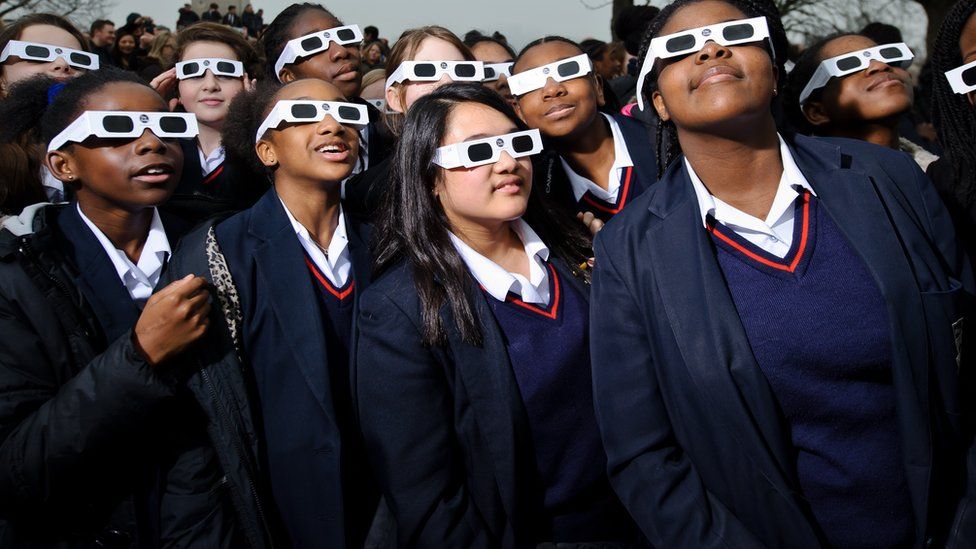
By Ruth Comerford
BBC News
A total solar eclipse is set to span North America on Monday – from Mexico to the very eastern tip of Canada.
The astronomical phenomenon will be less dramatic in the UK, but a partial eclipse could be visible in some parts of the country.
What is a solar eclipse and why is this one special?
A solar eclipse occurs when the Moon moves between the Earth and the Sun, blocking some or all of the Sun’s rays from reaching the Earth.
The phenomenon is a cosmic event, requiring the Sun, the Moon and the Earth to be in just the right alignment for the Moon to cast a shadow on our planet.
When this happens, the Moon casts two types of shadows.
One results in a partial solar eclipse, which covers only part of the Sun.
The other – and the more spectacular – is called a total solar eclipse, in which the Sun’s disc is entirely covered by the Moon, save for a delicate halo of scattered light coming from our star’s outer atmosphere.
A total solar eclipse occurs somewhere on Earth roughly every 18 months or so. The continental US was also lucky enough to see one in 2017, but its next significant opportunity won’t come until 2045.
Where and when can I see the eclipse in the UK?
The Moon’s full shadow ends its journey across the Earth in the Atlantic Ocean about 620 miles (1,000km) from Cornwall.
But it should still be possible to catch a partial eclipse from western parts of the UK, right before sunset.
Very simply, if you draw a line from about Fowey in Cornwall to Berwick upon Tweed in Northumberland, then everything west of that line might just get a view of the Moon biting the edge of the Sun as it disappears over the horizon.
You’ll need to be on high ground and have clear sky.
“With the partial solar eclipse occurring late in the day UK time, the Sun will be low to the horizon and will actually set before the spectacle is over,” BBC Weather presenter Simon King said.
How can I safely watch the eclipse?
The old advice of never looking directly at the Sun still applies – you should not stare at the eclipse directly.
Experts recommend using solar eclipse glasses, which have a special filter that blocks damaging UV rays. These glasses are different from sunglasses, as they block all light entirely except that coming from the Sun.
If you can’t get glasses, try piercing a hole using a pin into one piece of paper. With your back to the Sun, hold that paper above your shoulder so the sun’s rays can shine through that small little hole.
At the same time, hold up the another piece of paper in front of you.
It will act like a screen, on to which the Sun’s rays will be projected.
What will the weather be like on Monday?
In Northern Ireland and western Scotland, where the Moon will eclipse around 20% of the Sun, the weather does not look ideal.
Monday will see cloudy skies for most with spells of rain in south-west Scotland and Northern Ireland, according to BBC Weather.
In Wales and west England there will only be a small slither – 2% to 10% of an eclipse – and the weather is also looking cloudy with rain.
How do I watch the total eclipse online?
Audience members outside North America who want to see the total eclipse can catch our live coverage on the BBC website. There will be a livestream to watch the event as it happens and regular text and video updates on a live page.
Coverage will begin at 14:00 BST and continue throughout the day, complete with live dispatches from our reporters who will be stationed at eclipse gatherings across the US and Canada.
Where in the world will the total eclipse be visible?
People living in certain North American cities fall on the path of totality, which maps exactly where the total eclipse will be visible.
It spans locations from Mexico all the way to Newfoundland in the easternmost tip of Canada.
Big cities that should see the total eclipse include Dallas, Indianapolis, Cleveland and Buffalo, while Niagara Falls is expected to provide a spectacular view of the event.
For Canadians, the path of totality includes Hamilton, Montreal and Gander.
When was the last eclipse in the UK?
The UK’s last total solar eclipse occurred in 1999.
Thousands of people flocked to Cornwall, which was the only place in the UK to witness the event in its totality.
When is the next solar eclipse in the UK?
The next partial solar eclipse which will be visible from the UK is expected on 29 March 2025, when 30 to 40% of the Sun’s rays are expected to be blocked.
But the next full solar eclipse in the UK isn’t expected until 23 September 2090, according to the Royal Observatory in Greenwich.








